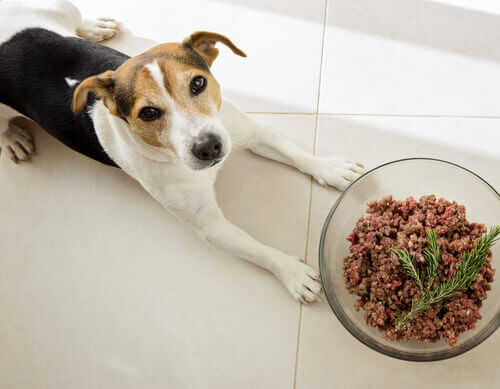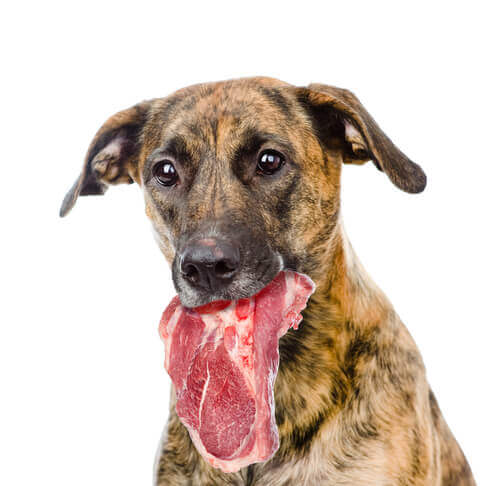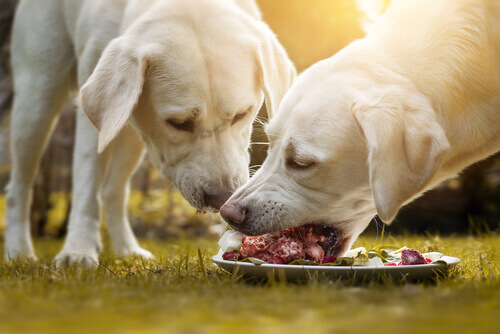Are Dogs Naturally Carnivorous?

You’ve probably heard people say “dogs are carnivores, their ancestors only ate meat!“. Well, the truth is dogs aren’t naturally carnivorous, as they also eat vegetables, which would make them omnivorous instead.
To say the least, this is an issue that provokes huge debates. In fact, a consensus around this topic hasn’t been achieved yet within the scientific community. This isn’t necessarily a bad thing, as one of the wonders of science is that nothing is ever taken for granted until the experts can prove it.
As long as there isn’t definitive evidence that proves one or the other theory right, the question will remain. We invite all readers to continue to walk these lines and participate in such an interesting debate.
Naturally carnivorous vs. naturally omnivorous
In order to be able to discuss this, it’s essential that we clearly define the terms involved first. Let us, therefore, clarify what a carnivorous diet consists of as well as an omnivorous diet.
Carnivorous diet
A diet consisting mainly of food from an animal origin. It can be fish or meat. From a biological point of view, the term ‘zoophagous’, which includes species that consume animal-based food, would be more appropriate.
The term ‘carnivorous’ may lead to equivocation as it seems to refer only to meat ingestion, but a dolphin that eats fish is also carnivorous. To make the debate more interesting, let’s go further and mention that some carnivores can eat plant-based foods, even if they represent an almost anecdotal percentage.
Among some carnivorous animals we can mention tigers, dolphins, hyenas, lions, and crocodiles to name a few.
Omnivorous diet
This diet consists of food obtained both from plants and animals alike. Compared to a carnivorous diet, plant-based foods and nutrients in this kind of diet represent a significant percentage of the total amount of food consumed.
However, the percentage of animal and plant-based food doesn’t necessarily need to be equal. Those percentages will mostly depend on the kind of animal, its habitat, or the time of the year. For example, a pig is an omnivorous animal, but when the season fills the ground with acorns, then it almost eats nothing else but this delicious fruit.
Some examples of omnivorous animals are humans, bears, hedgehogs, raccoons, and chimpanzees.

The big debate
There are many arguments for and against the idea that dogs are naturally carnivorous. Let’s expose the two sides of the coin:
Dogs are omnivores
First of all, to understand the modern dog’s diet we need to learn about what kind of diet their ancestors, the wolves, had. Although experts have already proven they’re different species, it’s interesting to understand what the evolutionary process of differentiation was like.
One of the genetic changes that seemed to be key to produce the dog’s actual appearance as a species was a mutation in the digestive system. The first proto-dogs began to approach the hominids in search of food, and thanks to a genetic mutation in their digestive enzymes, they were able to digest the plant leftovers they gave them.
This change could initially have been the first step towards an omnivorous lifestyle.
On the other hand, it has been proven that there are numerous plant-based foods that provide them with nutrients of valuable quality. In addition, they are also perfectly assimilated by the dog’s organism.
Dogs are naturally carnivorous
On the other side of the coin, we have other elements that make us think that dogs are carnivores. Its digestive system has adapted to a diet consisting of animal-based foods.
They have a fairly small intestine, which is a characteristic of meat-eating species. Nutrients found in meat are absorbed first and, thus, intestinal transit isn’t so necessary. In addition, dogs possess incisor teeth that act as grinding wheels prepared to tear and crush. In this sense, we could say that their teeth aren’t for chewing plant-based foods.

Conclusion
The question remains unanswered, at least clearly, because of a lack of definitive evidence and absolute proof.
However, in our opinion, and in case you might wonder, we speculate that dogs are indeed omnivorous animals. Bibliographic sources are full of studies and articles pointing towards the carnivorous theory, and many others towards the omnivorous one.
So, we’d like to encourage you to investigate such an interesting topic which has created so much debate in the scientific community. This way you can make your own conclusions and enjoy feeding your dear pet with its favorite foods even more.
